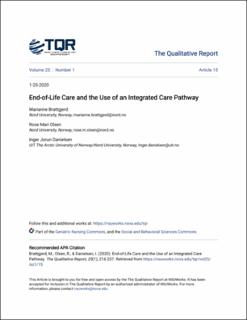End-of-life care and the use of an integrated care pathway
Peer reviewed, Journal article
Permanent lenke
https://hdl.handle.net/11250/2660876Utgivelsesdato
2020Metadata
Vis full innførselSamlinger
Originalversjon
Brattgjerd, M., Olsen, R. M. & Danielsen, I. J. (2020). End-of-life care and the use of an integrated care pathway. Qualitative Report, 25(1), 216-237Sammendrag
Liverpool Care Pathway is an integrated care pathway (ICP) designed to ensure the provision of high-quality end-of-life care. However, the ICP has come under substantial criticism, suggesting that its use is related to poor care. This study explores nurses’ use of the ICP to dying patients in Norwegian nursing homes. We conducted a qualitative study using an abductive, mystery-focused method to analyze the experiences of 12 registered nurses. Our findings show that the nurses experienced the ICP as a very useful tool in end-of-life care, although they were actually working independently of the ICP in the provision of ongoing bedside care for the dying patients. This can be understood as following: (I) the ICP is not compatible with the complex problems of dying patients; therefore, nurses must tinker with the ICP in order to give dying patients proper and dignified care; (II) the ICP is a myth with symbolic power, legitimizing care makes nurses positive towards the ICP; and (III) using the ICP as a loosely coupled system creates novel effects on nursing practice. In this study, we have shown how the ICP creates a common culture through a process of individual and collective sensemaking, which we labelled clinical mindlines.

